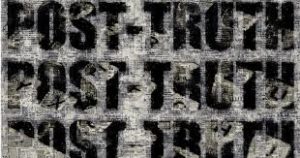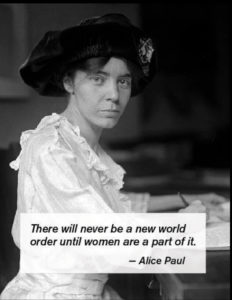January 20, 2019

“I keep coming back to a tweet from the Russian dissident and chess grandmaster Garry Kasparov, who wrote: “The point of modern propaganda isn’t only to misinform or push an agenda. It is to exhaust your critical thinking, to annihilate truth.” Mr. Kasparov understands that the real threat of the flood of “alternative facts” is that many voters will simply shrug, ask, “What is truth?” and, like Pontius Pilate, not wait for an answer.”
The Aspen Institute re-publishes a piece from American Magazine in 2017 from an Aspen Ideas Festival that same year with Charlie Sykes, MSNBC contributor and former conservative talk show host, currently editor-in-chief of the website The Bulwark.
“We might assume that people naturally want to seek out information that is true, but this turns out to be a basic misunderstanding of the human psyche and our new tribal politics. The social psychologist Jonathan Haidt describes the power of tribalism in shaping our ideas about truth. “Once people join a political team,” he writes in The Righteous Mind, “they get ensnared in its moral matrix. They see confirmation of their grand narrative everywhere, and it’s difficult — perhaps impossible — to convince them that they are wrong if you argue with them from outside the matrix.”
Mr. Haidt also cites the work of his fellow social psychologist Tom Gilovich, who studies the cognitive mechanisms of strange beliefs. If we want to believe something, Mr. Gilovich says, we ask, “Can I believe it?” and we need only a single piece of evidence, no matter its provenance, so “we can stop thinking” because we “now have permission to believe” what we want. The flip side is that when we are confronted with uncomfortable or unwanted information that we do not want to believe, we ask, “Must I believe?” and look for a reason to reject the argument or fact. Again, only a single piece of data is necessary “to unlock the handcuffs of must.”
The only antidote is an educated, critically minded electorate who can see through the hoaxes.”
Yes, absolutely. However, a deeper more complex follow-up question: is this a reasonable expectation, or possibility, in context of confirmation biases and deeper polarizations?
full article: https://www.aspeninstitute.org/blog-posts/truth-matter-no-longer-theoretical-question/
“And the fourth cycle (of computers), which is now arriving, shifts direction from the previous two (which were about connection more than processors) and brings prediction to the table. Call it AI if you want to, but to be specific, it’s a combination of analyzing information and then predicting what we would do if we knew what the computer knew.
The prediction of the fourth cycle isn’t simply done in a centralized location, because the previous cycle put the computer everywhere. So now, we’re connecting all the computers the way we previously connected all the people. Now, we’re giving those computers the ability to make predictions based on what thousands of people before us have done.”
-Seth Godin
Entrepreneur and blogger who thinks about the marketing of ideas in the digital age, teacher and former dot com guy.
January 19, 2019 
[Seen at the Women’s March 2019]
Eric Liu believes that we are on the precipice of a civic awakening. Even prior to the US presidential election, he watched as global movements rose up against established hierarchies and institutions. This inspired Liu to compose a guide for citizens who sought to create real, lasting change. The result was his new book, You’re More Powerful Than You Think.
Protests and marches are only the beginning of a movement. Truly knowing how to wield citizen power requires a deeper understanding of power itself.

Around the planet, great numbers of everyday citizens
are pushing back against concentrated, monopolized,
institutionalized power.
“Online activism is necessary, but completely insufficient,” Liu said. “What we’ve got to do to revive the body politic and to revive civic life is to use digital means for analog ends.” He mentioned the Tea Party model, a grassroots effort started on social media that made waves in congressional elections.
Despite their distinct cries, movements like Occupy Wall Street, the Arab Spring, and Black Lives Matter had one thing in common: they were the product of decades of radical inequality. “Around the planet, great numbers of everyday citizens are pushing back against concentrated, monopolized, institutionalized power,” Liu said. This will not be an easy fight. Those with power are unlikely to concede willingly. Changing the game will require leveraging the power of citizens who stay awake and show up.
Building America’s Next Great Awakening
March 19, 2018 
ASPEN INSTITUTE
“What do you think Americans should know to be civically and culturally literate?”
Lesson’s from the Women’s Suffrage Movement
No matter what one’s political leanings, everyone can learn from the history of the women’s suffrage movement.
Although (Alice) Paul may not be as well-known as Susan B. Anthony, Eleanor Roosevelt or Martin Luther King, Jr., all owe her a debt as her tactics of civil disobedience would become the tools of the push for Civil Rights and other movements. Her championing of equal rights would help shape the United Nations Charter, alongside the efforts of Eleanor Roosevelt. And Paul’s leadership also helped establish the permanent UN Commission on the Status of Women.
Alice Paul had cut her teeth in England, learning from activists how to get people’s attention for women’s rights by staging parades, street meetings, and protests, which led to her arrest and imprisonment. She put these lessons to work in the US, too. President Woodrow Wilson was appalled by Paul and her “unladylike” tactics, which she used in her public protests for women’s voting rights outside the White House and elsewhere in Washington.
In the same year, Paul spent seven months in prison for her civil disobedience, but she was not alone. Of her fellow demonstrators, about 500 were arrested, and 168 served prison sentences for their participation. While in jail, Paul led a hunger strike and was force-fed along with other women of the NWP, who demanded to be considered political prisoners rather than criminals.
Although they had sometimes been beaten by bystanders outside the White House, and called unpatriotic and worse during World War I, the NWP still fueled general outrage in the press and public. Under pressure from growing public support for women’s suffrage, Wilson finally relented in his opposition and offered his backing for an amendment. The Senate subsequently passed the Susan B. Anthony Amendment for equal suffrage on June 4, 1919.
The 19th Amendment to the US Constitution was ratified by the required three-fourths of the states and became law just before the 1920 election.
[full article: https://www.aspeninstitute.org/blog-posts/lessons-womens-suffrage-movement/]



